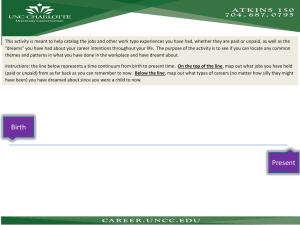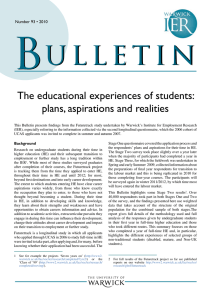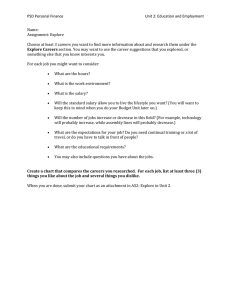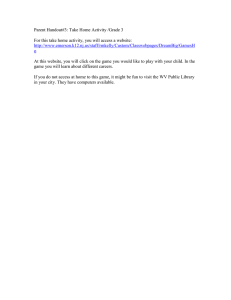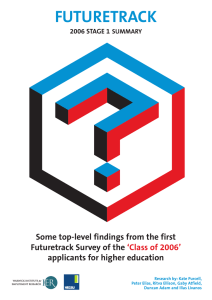STAGE 2 SUMMARY - 1 - Research by Kate Purcell, Peter Elias,
advertisement
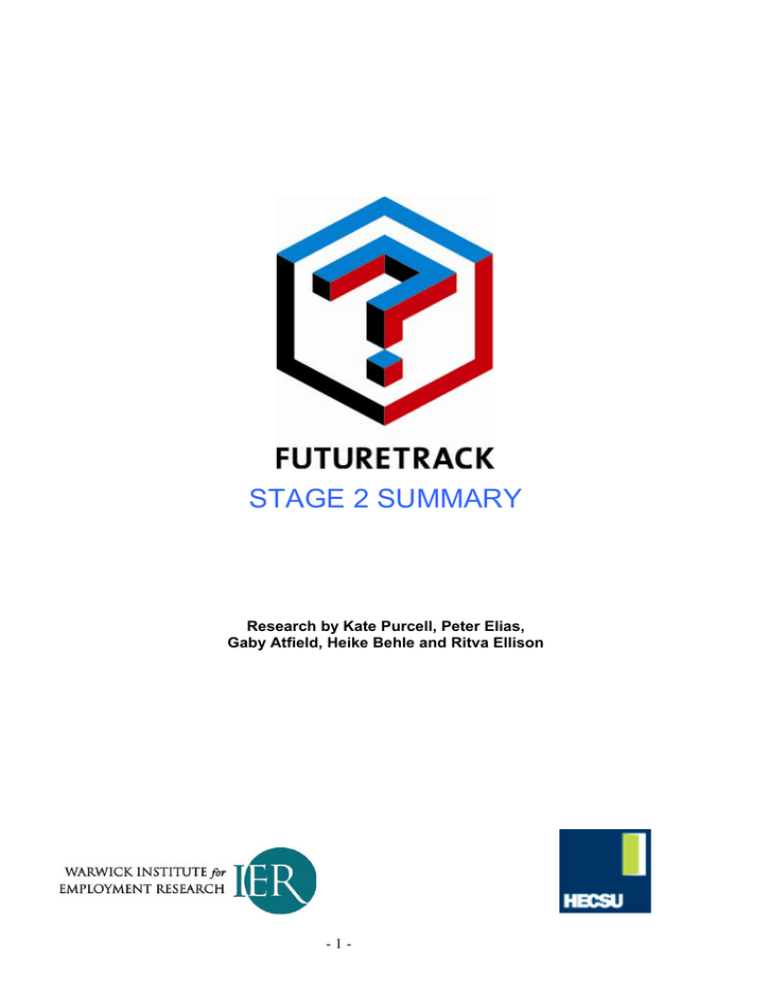
STAGE 2 SUMMARY Research by Kate Purcell, Peter Elias, Gaby Atfield, Heike Behle and Ritva Ellison -1- ABOUT FUTURETRACK Futuretrack is the most ambitious higher education research ever conducted in the UK. By following a group of students from UCAS application until they get their first job, Futuretrack is building a ‘real-time’ picture that reveals how, when and why students make decisions. The study is helping the government, careers advisers and education professionals to provide the best possible information and guidance to students throughout their academic careers. WHO IS TAKING PART? Every full-time 2006 UCAS applicant was invited to take part in Futuretrack. ------------------------------------------------------------------------------------------------------------------------------------------------------- STAGE 1 Choices, funding and expectations: applying to higher education Futuretrack Stage 1 examined the choices people made when deciding whether or not to enter Higher Education. It considered the reasons applicants choose to apply to certain institutions and courses, and asked them about their financial plans and their attitudes towards debt. It also explored applicants’ attitudes towards higher education, examined why they wanted to continue with their education, and asked them if they think a higher education qualification is a good investment. STAGE 2 Plans, aspirations and realities: the experience of students in their first year of higher education Futuretrack Stage 2 invited students to evaluate their first year of higher education. Students were asked to reflect on their experience of the teaching, learning support and resources provided by their institution. The survey also examined how they were managing their money and asked why some students undertook paid employment during their studies. Students were also asked about their extra-curricular activities and their attitude to unpaid and voluntary work, as well as their plans for the future. Categories of Higher Education Institutions (HEIs) The researchers developed a new way of classifying universities and colleges by ‘tariff’, and were able to use this as a basis for comparison between different types of institution. The tariff points an applicant has can be considered in some respects to be a tangible measure of their educational capital, and the tariff points required by institutions are generally indicative of the comparative status of the institution and the competition to enter it (although the reliability of these measures is still open to debate). For the purposes of Futuretrack, HEIs were ranked according to their UCAS tariff points score, and then grouped according to their ranking. The six distinct categories identified were: Highest Tariff, High Tariff, Medium Tariff, Lower Tariff, General HE College, and Specialist HE College. -2- STUDENT EXPERIENCE The second stage of the Futuretrack study looks in more detail at student experience of Higher Education. STUDENT EXPERIENCE OF HIGHER EDUCATION KEY QUESTIONS - Are students satisfied with the teaching and learning support they have received? - Does student satisfaction with library and information resources vary across institutions? - Are students surprised by the workload and the standard of work expected of them? - Why do some students change courses in their first year? STUDENT EXPERIENCE OF TEACHING AND LEARNING SUPPORT • • • • • • Over 80% of Futuretrack respondents agreed that the tuition and learning support their received on their course was excellent. Students studying at highest tariff universities were most likely to be satisfied with access to library resources and web-based learning facilities. Students whose parents belonged to a higher socio-economic classification were less likely than other respondents to feel that their workload was excessive. A quarter of respondents reported that the standard of work required was higher than they had expected. Students from a lower socio-economic background were more likely than other respondents to report that the work was harder than they had expected. The most common reason students gave for changing their course was that they did not enjoy it. STUDENTS IN THEIR OWN WORDS ‘[The standard of work was] not quite higher than I expected, but I expected there to be more support especially with the first assignment, to clarify the standard’ ‘Didn’t really know what to expect. The difficulty of the work wasn’t too bad, but the volume was a lot’ -3- ‘Did not expect there to see such little work at points and then masses at others – but understand this is to encourage us to manage our time better’ ‘As a mature student who completed an Access course in 2005/6 I was not absolutely sure what to expect’ EXTRA-CURRICULAR ACTIVITIES What kinds of extra-curricular activities do students engage in outside their academic studies? KEY QUESTIONS ACTIVITIES THAT STUDENTS PARTICIPATED IN AT LEAST THREE TIMES (2006-2007 ACADEMIC YEAR) - What kinds of extracurricular activities are Futuretrack respondents engaged in? - How does provision of on-campus extracurricular activities Student experience of extra-curricular activities vary across institutions? - Do any students face barriers to their participation in extracurricular activities? ACCESS TO EXTRA-CURRICULAR ACTIVITIES • • • • • Men were more likely than women to engage in extra-curricular activities – especially sports. Students from the highest tariff universities and those from higher socio-economic groups were most likely to take part in extra-curricular activities within their university. Students from general HE colleges were most likely to take part in extra-curricular activities outside the university. Students who were not living in university accommodation and who were travelling from far away often had fewer opportunities to engage in extra-curricular activities. Students at higher tariff universities were more likely than students at medium and lower tariff universities and those at specialist and general HE colleges to agree that they had excellent opportunities to engage in extra-curricular activities. STUDENTS IN THEIR OWN WORDS ‘Haven’t really got an opportunity to [take part in extra-curricular activities], the campus where all these activities take place is the main campus, which is a 40 min bus journey. I would have carried on with a sports team…rugby or netball’ ‘No time to do anything but study, study and more study’ ‘I haven’t participated in any [extra-curricular activities] due to my situation at home – I live 20 -4- miles away from my uni so I travel in every day. I have to be a stay at home student due to both my parents’ ill health. Therefore I have had no time to join such clubs’ ‘There was lots available, but I chose not to participate as I am a single parent with a young son who needs any spare time I have outside my studies’ STUDENT FINANCE AND PAID WORK How do students manage their money? KEY QUESTIONS - What kinds of financial difficulties do students face in their first year? DIFFICULTIES EXPERIENCED BY FIRST YEAR STUDENTS DUE TO SHORTAGE OF MONEY - What percentage of Futuretrack respondents undertook paid employment during their first year? - Why do students choose to work, and do reasons for working vary between different student groups? - How are students accessing opportunities for paid work? STUDENTS AND PAID EMPLOYMENT • • • • • • • Two-thirds of Futuretrack respondents had done some form of paid work during the 2006-2007 academic year. 36% worked both during term-time and in vacations. Many students worked in order to cover essential living costs, to pay for books and study materials, and to pay for leisure activities. Students also worked because they were keen to avoid having too much debt. Students working during term-time and working long hours were more likely to come from lower socio-economic backgrounds, minority ethnic groups and disadvantaged educational backgrounds. On average, students who had undertaken paid employment during term-time worked just over nine hours a week. Students most commonly accessed paid work opportunities via existing relationships with employers, by contacting employers directly, or through their university’s ‘job-shop’. STUDENTS IN THEIR OWN WORDS ‘The student loan doesn’t cover the summer holidays, so I have to work to afford the rent on my house’ ‘[I undertook paid work because I wanted to gain] experience of working within a professional theatre company and production team’ ‘It was impossible for me to avoid debt entirely, but working helped to reduce my debt’ ‘As a mature student I [have to work] because I am independent and have financial obligations’ ‘[I continued to work] to maintain professional contacts in preparation for post degree selfemployed consultancy’ ‘[I worked] to pay for the high cost of childcare’ -5- Voluntary Work and Unpaid Work Experience Why do students undertake unpaid work experience? KEY QUESTIONS WHY DO STUDENTS UNDERTAKE UNPAID WORK? (BY GENDER) - Why do students undertake unpaid work? - How many students undertake unpaid work in their first year? - What kinds of unpaid work do students undertake? TYPES OF UNPAID WORK UNDERTAKEN BY FUTURETRACK STUDENTS • • • • • • • • Voluntary work in schools University related activities e.g. helping at careers fairs, assisting with university open days, writing for the university magazine Community based activities e.g. working with Brownies, serving as Special Police Officers, participating in church activities Sports coaching Student Union e.g. campaigning in student elections, manning the cloakroom at the Student’s Union Fundraising e.g. raising money for hospitals, working for a charity which supports homeless people, taking part in sponsored walks Politics e.g. campaigning for national political parties Helping family and friends e.g. tutoring friends, unpaid work for the family business -6- STUDENTS AND UNPAID WORK • • • • 30% of women and 22% of men undertook voluntary or unpaid work in their first year. 90% of students involved in university related activities were aged 21 or under. Over a third of the students engaged in sports coaching were studying sports exercise or related subjects. Two of the most commonly cited reasons for doing unpaid work were related to personal development (learning new skills and gaining work experience). CAREER PLANNING How are first-year students planning for the future? KEY QUESTIONS HOW ARE STUDENTS ACCESSING CAREERS ADVICE? (BY AGE GROUP) - How are first-year students accessing careers advice? - Are students making use of their University Careers Service? - What are students planning to do once they have completed their course? STUDENTS AND CAREER PLANNING • • • • • Mature students, male students, black students, students studying discipline-based academic subjects, students studying at higher or medium tariff universities, and European or overseas students were more aware than other respondents of the services their University Careers Service offered. Black and Asian students were more likely than white students to have used their University Careers Service. 36% of all degree students were planning to study for a taught Master’s degree after they had completed their undergraduate course. Younger students were more likely than mature students to be planning to take a gap year after university. Mature students were less likely than other students to participate in careers events organised for first year students, and more likely to take part in individual advice sessions. STUDENTS IN THEIR OWN WORDS ‘Decided I would leave all long term decisions regarding employment until my second year was complete’ ‘I’m studying physiotherapy – the course is completely geared to one career. We all came to this course with a great deal of careers information and guidance, given prior to deciding upon this course’ ‘Because my course is quite unusual, careers advice is given by the lecturers’ ‘Found that there was more emphasis on younger student careers, not careers for the mature students with family/time commitments’ ‘As a mature student I have a clear goal in mind already’ ‘I attended a career related conference and obtained advice from professionals working in the field I wish to enter’ ‘As my course leads directly to nursing there was no careers advice give. However, I think careers advice on the different branches of nursing and the nursing bands would have been useful’ ‘I attended presentations by professional bodies on applying for jobs after qualification [and] sought informal guidance from lecturers’ ‘Doing internships greatly widens your horizon and gives you valuable insight into a possible future career path’ ‘I am not at university for a career’ -7- WHAT’S COMING NEXT? Futuretrack Stage 3 was conducted between February 2009 and July 2010. FUTURETRACK STAGE 3 Futuretrack Stage 3 invites students to reflect on their overall experience of Higher Education, and asks them to describe their plans for the future. STAGE 3: KEY QUESTIONS • • • • • • • • • Given their time again, would students still choose to do the same degree course? Do they think participating in higher education has helped them to develop their skills? What kinds of jobs do students apply for in their final year? Would they consider applying for unpaid work or internships to gain more experience? Where in the country are students hoping to work? Will their job be related to the subject they studied for their degree? Which students are considering postgraduate study? What are students looking for from their first job? What kinds of careers advice have they had? STAGE 3: PRELIMINARY FINDINGS We’ll be releasing more details about Futuretrack Stage 3 over the coming months, while the full Futuretrack Stage 3 report will be released in Spring 2011. FURTHER INFORMATION If you would like to read the Futuretrack Stage 2 report in full, please visit http://www.hecsu.ac.uk/research_reports.htm For more information about the Warwick Institute for Employment Research (IER) go to http://go.warwick.ac.uk/glmf -8-
